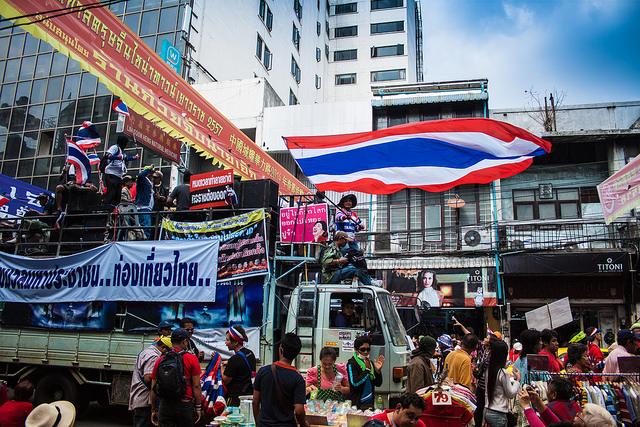Thai election likely to cement military’s power
Posted By Luke Courtois on March 22, 2019 @ 06:00

On 24 March, Thailand will have its first national election since the 2014 coup. Regardless of the outcome, it’s unlikely that the junta’s political ambitions will change.
This week the campaign continued on its unpredictable path after the unexpected development in early February when Princess Ubolratana announced she would run for political office. The princess is the eldest child of former monarch King Bhumibol Adulyadej, and the sister of the current monarch, King Maha Vajiralongkorn. In 1972 she renounced her royal titles when she married an American and settled in the United States. Her decision to run raised questions about the emergence of new royal networks [1] in Thai politics. No royal family member had ever attempted to run for elected office before. Adding to the confusion, Princess Ubolratana registered her candidacy with Thai Raksa Chart, an offshoot of the populist, pro-democracy Pheu Thai Party. But King Maha Vajiralongkorn quickly vetoed his sister’s candidacy, declaring that it violated the constitution.
In the meantime, Thailand has witnessed the emergence of a new pro-democracy champion. The leader of the Future Forward Party, Thanathorn Juangroongruangkit, has been a vocal critic of the junta in the past year, challenging [2] the authority and legitimacy of its leaders. He has promised to change the 2017 constitution and vowed to cut the army’s budget [3] and to eliminate the junta’s influence over Thai politics. Thanathorn is very popular [4] among young adults and, with more than 7 million people voting for the first time [5] in this election, he could provide a serious challenge to junta leader Prayut Chan-o-cha, who led the 2014 coup against an elected government and is now a candidate for the pro-military Palang Pracharat Party.
As a result, some observers might view this election as a positive step forward for democracy in Thailand. Indeed, a record number of parties have registered, with 68 prime ministerial candidates. Unfortunately, much of the media attention has focused on the unpredictability of the poll rather than on the fact that the election will not change the overall balance of power within Thailand’s fraught political system.
This election provides only a semblance of democracy.
Thailand has a long history of military interventionism. Since 1932, the country has witnessed 21 successful or attempted coups against elected governments, the most recent in May 2014 when the military removed Yingluck Shinawatra from power.
For the past five years, the junta has placed itself at the centre of a new political system designed to reinforce its political influence. The National Council for Peace and Order (NCPO), a group of seven senior members from all branches of the Thai army and police headed by former general and junta leader Prayut, and the National Legislative Assembly [6], have replaced state institutions to become the ultimate decision-making bodies in Thailand.
Under Prayut’s leadership, the NCPO has sought to maintain a high level of control over Thai politics, using the legislative assembly to weaken Thailand’s democratic institutions and reinforce the junta’s control of the political system in several ways.
In 2017, the NCPO wrote a new constitution [7] which made changes to the parliamentary system [8] that give the junta the ability to maintain power even after the election. In the previous system, the party with the most seats in the house of representatives had the power to appoint the prime minister. Under the new charter, the junta has set up a bicameral system in which the senate, whose members are handpicked by the NCPO [8], will also have the power to appoint the prime minister. Requiring a majority of members of both houses makes it more difficult for elected MPs to counter the military’s political influence.
On Sunday, Thais will vote only for members of the lower house, which is made up of 500 MPs. Because the junta is likely to control the 250 senators who make up the upper house, the junta will need only 126 seats in the lower house to obtain the 376 votes needed to appoint its preferred prime minister. It’s going to be much more difficult for pro-democracy parties to counter the junta’s political influence under this new system.
The junta’s desire to limit the decision-making power of elected officials hasn’t changed [9]. This is reflected in the new army chief’s refusal to rule out another coup [9] if riots occur. More worryingly, in response to prime ministerial candidates who said they would cut the military’s budget [10], the junta has suggested politicians listen to ‘Nak paendin’ (‘Burden of the land’), an ultra-nationalist song that invokes memories [11] of deadly political crackdowns in the 1970s [12]. This veiled threat of violence shows the junta is not ready to relinquish power.
It is true that Thai juntas have almost always failed [13] to consolidate their political influence through elections. But for decades they have successfully exploited political divisions to undermine elected governments and democracy more broadly. Major political unrest and violent street protests have regularly been used by juntas to justify their political interventions, particularly in 2014, when Prayut declared the coup would bring ‘happiness [14]’ back to the people.
Predicting the outcome of this election may be difficult, but one thing is certain: the prospect of Thailand doing away with years of military interventionism is slim.
Article printed from The Strategist: https://aspistrategist.ru
URL to article: /thai-election-likely-to-cement-militarys-power/
URLs in this post:
[1] emergence of new royal networks: https://www.newmandala.org/new-networks-in-thai-royal-politics/
[2] challenging: https://www.youtube.com/watch?v=xJVQO_DOMd4
[3] vowed to cut the army’s budget: https://www.bangkokpost.com/news/politics/1582234/future-forward-party-vows-to-cut-army-budget
[4] very popular: https://www.straitstimes.com/asia/se-asia/thailands-rising-political-star-thanathorn-under-fire-as-election-nears
[5] first time: https://www.chiangraitimes.com/billionaire-thanathorn-juangroongruangkit-thailands-rising-political-star-under-fire-as-election-nears.html
[6] National Legislative Assembly: http://library.siam-legal.com/thai-law/interim-constitution-of-thailand-national-legislative-assembly-sections-06-14/
[7] wrote a new constitution: https://www.straitstimes.com/asia/se-asia/thailands-new-constitution-what-you-need-to-know
[8] changes to the parliamentary system: https://www.chiangraitimes.com/thailands-junta-prime-minister-justifies-his-junta-senator-selection.html
[9] hasn’t changed: https://www.bangkokpost.com/news/politics/1559750/army-chief-refuses-to-rule-out-fresh-coup
[10] cut the military’s budget: https://www.bangkokpost.com/news/politics/1630926/army-chief-sees-red-over-pheu-thais-defence-budget-cut-plan
[11] invokes memories: https://www.thaipbsworld.com/army-chief-tells-media-to-listen-to-nak-paendin-ultra-nationalist-song/
[12] deadly political crackdowns in the 1970s: https://www.abc.net.au/news/2016-10-06/survivors-of-1976-student-massacre-shine-light-shadow-history/7907202
[13] almost always failed: https://www.newmandala.org/why-thailands-generals-fail-to-co-opt-elections/
[14] happiness: https://www.theguardian.com/world/2014/jun/04/thailand-to-bring-happiness-to-the-people
Click here to print.